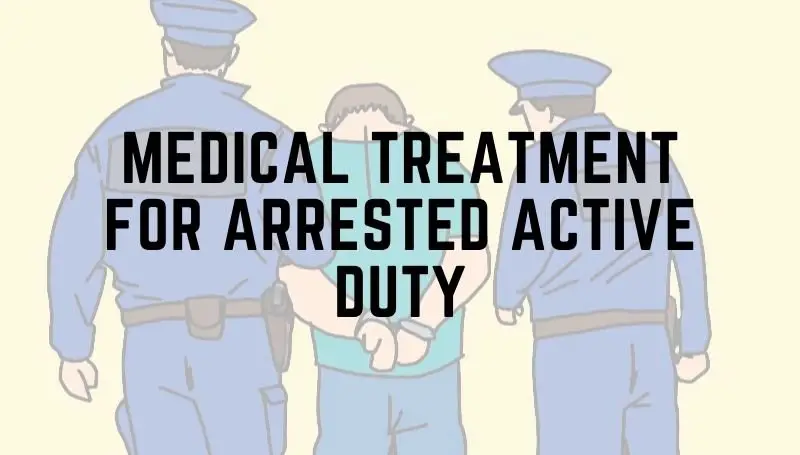If a suspect is under arrest and is injured. Medical treatment must be provided and deemed medically reasonable to be released before it can be delivered to the hands of authority. There are a few guidelines into how an individual can be released to law enforcement.
How are non-active duty patients handled in the hospital during a warrant of arrest?
The most typical situation is when a non-active duty patient is released from treatment. Once the treatment facility is no longer exercising any of its expertise and deemed that it is reasonable to discharge the patient, then the normal legal process will occur.
Hospital personnel is not required to take any official action before local authorities can take custody of the released patient. However civil law enforcement officials should be notified of an imminent release of the patient.
How are active duty patients handled in the hospital during a warrant of arrest?
In this situation, the commanding officer is authorized to deliver the person to federal law enforcement authorities. As long as the authorities maintain proper credentials and display to the command that the federal warrant for the arrest has been issued.
However, in certain situations, this type of delivery may be refused.
In these cases, guidance should be sought out from the judge advocate of the Navy or Marine corps when delivery is denied.
Which organization is normally responsible for taking custody of an active duty suspect?
It is customarily the responsibility of the command to take custody and control of an active duty member who is suspected of committing a crime. If the member is an unauthorized absentee (UA), meaning that this person does not belong to the local area, then release of the patient should be coordinated with the closest Transient Personnel Unit (TPU) for the Military Prisoner Escort Unit. In the meantime, open communications with the active duties permanent command should be established.
What would happen if the local authorities were to request delivery of an active duty suspect?
There are some cases when the local civil authorities may be the ones to request the delivery of an active duty patient. The commanding officers may be authorized to deliver the patient if the proper warrant is presented. However, if this situation occurs it is recommended to consult with a judge advocate of the Navy or Marine corps before delivery.
What would happen if a jurisdiction outside of the local area requests delivery of active duty?
If the treatment facility where the active duty patient is being treated is located outside the jurisdiction that is requesting the delivery then only a General Courts Marshall authority (defined by the Uniform Code of Military Justice, Manual for Courts-Martial and Navy Regulations) is authorized to arrange for the delivery of the patient. Paperwork and agreements and other prerequisites to the delivery will have to be completed.
What happens if the military is not done with the active duty but civil authorities are requesting delivery of the active duty?
If in a situation where the disciplinary proceedings involving military offenses are still pending, the treatment facility should obtain legal guidance from the judge advocate before delivering a patient to Federal, state, or local authorities. If there comes a situation where the commanding officer has reasonable judgment that delivery should be denied then the judge advocate general of the Navy must be notified of the circumstances by message or phone.

